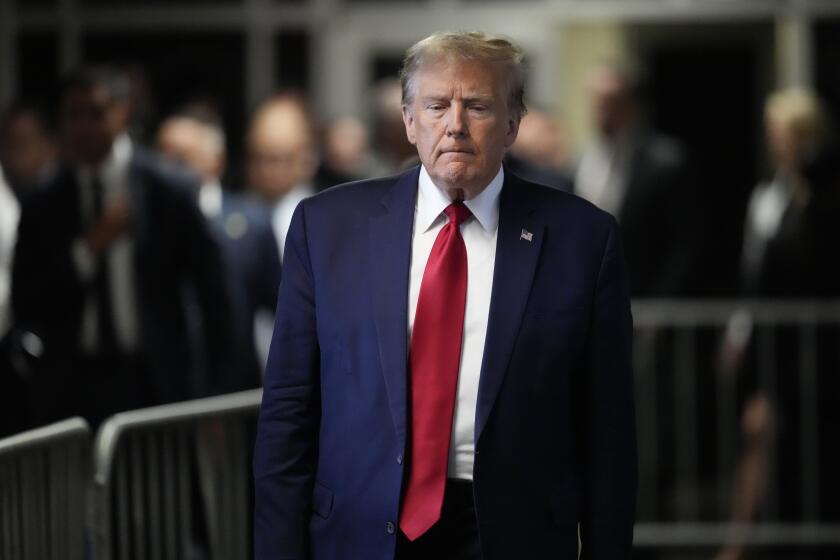Carona acquittal? Don’t bet on it
If you’re going to bet against the U.S. government when it brings corruption charges against a public official, you better get some pretty good odds. No one’s offered me any, so I ain’t betting.
As I sit now in front of the keyboard Thursday afternoon, the jury in the Mike Carona corruption case is in its first couple of hours or so of deliberations. Who knows? By the time you read this today, jurors may have already laid a guilty verdict on the former Orange County sheriff.
That’s probably where the smart money lies. Although the much-heralded secretly recorded tape conversations between Carona and former Assistant Sheriff Don Haidl have plenty of ambiguity in them, some portions are potentially deadly for Carona.
In his closing argument Thursday, Assistant U.S. Atty. Brett Sagel cited specific passages from the conversations in 2007 that he says point to Carona’s guilt, but he was also persuasive when he discussed the meetings in a different vein. Why would Haidl, the government’s star witness, agree to its request to secretly tape-record the conversations if he knew his allegations against Carona were false? And why did Carona, still sheriff at the time, continue the conversations with Haidl after they turned to subjects like lying to a federal grand jury if he was innocent?
So, is Carona’s goose cooked? Is there any way he can beat the rap?
If only for the sake of contrariness, let me proffer a road map to acquittal.
We take you to the jury room, where the 11 men and lone woman are laying out the big-picture narrative, which began with Haidl laundering campaign contributions -- at Carona’s request -- to help elect him in 1998. Then, with the promise of an assistant sheriff’s job in the offing, Haidl began paying Carona monthly bribes of $1,000 that continued until mid-2002.
As jurors contemplate classic bribery cases, this arrangement may give them pause. It boils down to an unpaid assistant sheriff bribing the sheriff. I wonder if there’s precedent for that in law enforcement annals.
I don’t recall anybody testifying that the original job offer, which Haidl at first didn’t jump at, was contingent on Haidl’s paying Carona anything. In fact, Haidl testified that the payments were his idea but that he didn’t demand anything for them.
Haidl, of course, did get something: the assistant sheriff’s job. He thought he would profit handsomely from it, but he didn’t, at least not financially. Yet he testified that he kept making the monthly payments, even though there was no apparent pressure from Carona that he do so. In fact, Haidl testified, the men and their families became close friends soon after they met.
At that point, then, jurors have a bribery situation between friends. They see the Haidl-Carona axis as being somewhat suspect but don’t see it as proof of a runaway corrupt administration.
Let’s take our next step and assume jurors accept the defense team’s argument that Carona thought Haidl was qualified to run the reserves program for the new administration. Presumably, the jurors will next have to grapple with Haidl’s allegation that he made the monthly illegal payments. Carona’s lawyers argued that the payments never occurred and that Haidl’s testimony on that score can’t be trusted for a variety of reasons.
If the concept of an assistant sheriff bribing the sheriff -- each a good friend to the other -- doesn’t make sense to jurors, they might well take the next step and buy the defense argument that Carona didn’t sell his office to Haidl.
That allows them to conclude that Carona didn’t corrupt his office by selling it to Haidl. Jurors know that another former assistant sheriff, George Jaramillo, has pleaded guilty to being part of the alleged conspiracy. Perhaps they’ll conclude that Haidl and Jaramillo were the culprits, and that Haidl is incriminating Carona to ingratiate himself with federal prosecutors who gave him a sweetheart deal in exchange for his testimony.
So, let’s say that jurors get that far down the road on their way to acquittal.
Next stop: the tapes.
Without the tapes, the government probably doesn’t even bring this case to court. But, ironically, in the absence of Carona’s taking the stand, the tapes represent his only spoken words to the jury.
Let’s argue, just for fun, that jurors accept the defense arguments that the tapes aren’t what they seem and require much more context. But how to dismiss Sagel’s counter arguments about why Carona would even talk about such unsavory subjects?
If nothing else, in parts of the tapes Carona sounds like someone who knows he’s guilty of something, even if it isn’t the government’s depiction of pervasively corrupt administration.
How are the tapes anything but a roadblock to acquittal?
This is where I screech to a stop.
I can picture jurors being uneasy with the scope of the government’s allegations. I can see them being upset that Haidl got off lightly and that Jaramillo wasn’t called to testify. I can picture them thinking the case isn’t worth sending Carona to the state pen.
But with those tapes in play, I can’t picture all 12 jurors voting for acquittal.
Carona doesn’t need 12. Any holdouts, even one, can create a hung jury and a mistrial.
As for how those holdouts would square their votes with Carona’s remarks on the tapes, I can’t wait to hear that.
--
More to Read
Sign up for Essential California
The most important California stories and recommendations in your inbox every morning.
You may occasionally receive promotional content from the Los Angeles Times.










